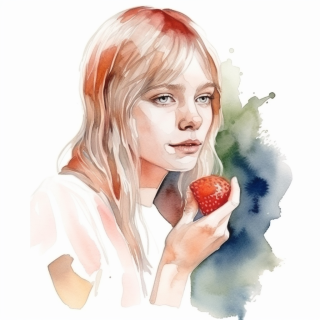Gut-Brain Axis
Can Prebiotics Improve Your Mood?
Prebiotics are fiber that feed your good microbes to boost the gut–brain axis.
Updated March 15, 2024 Reviewed by Michelle Quirk
Key points
- Prebiotics are substances that feed beneficial microbes in your gut.
- Gut integrity is essential to preventing systemic inflammation.
- Minimizing inflammation is key to boosting mood and cognition.
The food you eat can have as profound an effect on your brain as the drugs you take. –Dr. Uma Naidoo
Depression, according to the World Health Organization, is the number-one cause of disability today. The loss of productivity costs the global economy a staggering trillion dollars a year. Psychiatry has responded with therapy and drugs, with mixed success.
The notion that the gut and the brain are somehow connected has presented psychiatry with a new paradigm: Gut microbes may, directly or indirectly, cause or prevent anxiety and depression. This begs the question: As well as treating the mind, should we also be treating the gut?
The basic thesis of the gut–brain axis is that our gut can become unbalanced, with a few unsavory bacteria dominating the mix. This imbalance can lead to a “leaky gut,” allowing toxins and bacteria to enter the bloodstream. From there, they are pumped to every organ in the body, including the brain.
This systemic inflammation can cause anxiety in a matter of seconds. Think of how quickly food poisoning can get your attention. Over time, chronic inflammation can lead to a shocking number of diseases, including heart disease, type 2 diabetes, arthritis, and dementia.
In addition to inflammation, your gut microbes can directly produce neurotransmitters like dopamine and serotonin, two important targets of psychoactive drugs. These communication chemicals are used by microbes to talk to each other, but also to talk to us via the vagus nerve that winds its way from the gut to the brain.
There has now been quite a lot of research on the use of probiotics to rebalance our gut microbes, and there has been some notable success. Probiotics that can improve our mood are called psychobiotics, a name coined by prolific investigators John Cryan, Catherine Stanton, and Ted Dinan of University College Cork, in Ireland. Most probiotics don't colonize the gut, but they produce gut-friendly chemicals as they pass through.
What Prebiotics Are
Recently, Cryan and Dinan have expanded the definition of psychobiotics to embrace prebiotics—the food for probiotics. These include substances called oligosaccharides, which are complex sugars that our body can’t digest, but our microbes can. This microbial manna is also called fiber.
When our gut microbes are fed these prebiotics, they produce substances called short-chain fatty acids, which act to both heal and nourish the cells lining the gut. This puts a damper on leaky-gut syndrome, quenching inflammation and returning our brains to business as usual.
A recent Brazilian study found that prebiotics modified the composition of the microbiota, which, in turn, improved the growth and repair of intestinal tissue. A new Chinese study found that two different oligosaccharides, at a dosage of 1 to 5 grams per day, reduced symptoms of depression. The two prebiotics were galacto-oligosaccharide (GOS) and a polyphenol derived from green tea, epigallocatechin gallate (EGCG).
The authors say, “The plausible mechanisms underlying the impact of prebiotics on depression include the synthesis of neurotransmitters, production of short-chain fatty acids, and regulation of inflammation.”
Taking Advantage of This Research
Prebiotics in general are derived from plants, so increasing your consumption of veggies and berries may improve your gut and your mood. The top veggies for fiber include onions, garlic, lentils, artichokes, and asparagus. The top fruits include raspberries, blueberries, strawberries, and blackberries.
Variety is also important. A balanced gut ecosystem is highly diverse, with no overly dominating species. Some dietitians recommend 30 different veggies per week, which may be difficult for some people to even comprehend, let alone accomplish. That may be a dietetic ideal, but adding even five veggies a week into a Western diet can work wonders. If you just can’t get that many veggies into your diet, try a prebiotic supplement. In line with the diversity argument, get a blended prebiotic to support a variety of beneficial microbes.
There is something else we need to talk about. Fiber may be healthy, but those energized microbes can generate gas. This is a real effect, but it can be minimized by starting with small additions of fibrous food and slowly ramping up. Over time, as your gut balances out and becomes comfortable with your new fiber regime, the gas will subside. Mostly. But it’s worth it: Farts are funny; depression is not.
If you have IBS or IBD, talk to your doctor before you start increasing fibrous food or taking prebiotic supplements. During a flare-up of these diseases, it may be better to lower your fiber to minimize gas. These low-fiber diets aren’t intended to last forever, but they are helpful during a flare-up.
In Sum
These studies demonstrate once again that the gut–brain axis is real and significant. Depression may be caused by grief, and it often softens with time. But some cases of depression don’t seem to have obvious foundations. Amazingly, these may be rooted in the standard American diet, which is absurdly low in prebiotic fiber. This mix of depression and poor diet describes a sizeable segment of the population, and not just in America.
If this sounds like you, give veggies, berries, and prebiotics a try. If it sounds like a friend or loved one, share this research!
References
Yang, Yongde, Bi Zhou, Sheng Zhang, Liang Si, Xiaobo Liu, and Fu Li. “Prebiotics for Depression: How Does the Gut Microbiota Play a Role?” Frontiers in Nutrition 10 (July 6, 2023): 1206468.
Corrêa, Renan Oliveira, Pollyana Ribeiro Castro, José Luís Fachi, Vinícius Dias Nirello, Salma El-Sahhar, Shinya Imada, Gabriel Vasconcelos Pereira, et al. “Inulin Diet Uncovers Complex Diet-Microbiota-Immune Cell Interactions Remodeling the Gut Epithelium.” Microbiome 11, no. 1 (April 26, 2023): 90.
Dinan TG, Stanton C, Cryan JF. Psychobiotics: a novel class of psychotropic. Biol Psychiatry. 2013 Nov 15;74(10):720-6. doi: 10.1016/j.biopsych.2013.05.001. Epub 2013 Jun 10. PMID: 23759244.





